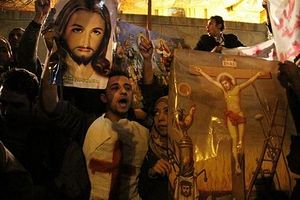Martco
Tosatti
Rome,
March 13, 2012
Makram
Diab, an Egyptian Coptic Christian, was
sentenced to six years in prison by a court in
the province of Assiut on charges of
“insulting the Prophet.” But the
trial took place with a crowd of two or three
thousand Muslims outside the courthouse demanding
the death penalty. Eyewitnesses said that many
protesters were armed with knives, and that the
police barely managed to prevent them from breaking
into the courtroom and lynching the accused.

Diab’s lawyer, a Muslim called Ahmad Sayed Gabali, said he had never seen anything like it in 18 years of practicing law. “More than 80 Islamic lawyers representing the plaintiffs filled the courtroom. They locked the door from the inside, preventing the judge from leaving and preventing me from entering the courtroom to defend my client.”
All of this arose from a 9 February discussion between Makram Diab, who is a school secretary, and a Salafi teacher. The discussion was heated, but ended with no apparent consequences. But on 23 February, thirteen days later, another teacher, Abd el-Hamid - who was not present during the incident - complained to the police, and the complaint was signed by eleven other teachers, accusing Makram Diab of having insulted the Prophet of Islam.
Attorney Gabali said: “It was a normal discussion, which could have happened anywhere. It was provoked by the teacher, who had been transferred between various institutions after being admonished for insubordination, and is being manipulated by the Salafis, who are using Diab as a scapegoat.”
The lawyer says that when he approached the courtroom, he saw that there was a crowd of Muslims, as well as teachers and students, gathered in front of it. There was a display of Islamic flags and fundamentalist chants. “There were fourteen or fifteen of us, and about a dozen policemen to secure the courtroom, faced with a crowd of at least 2500 Muslims.” The attorney waited in his car to be summoned by a police officer, who would then escort him into the courtroom. But the summons never came. According to Gabali, the fundamentalists’ plan was to distract the police with the lawyer so that they could attack the accused in court. The media gave scant coverage to the event, and the precise details of the accusation have never been revealed.
And of course, versions of what really happened diverge. According to the official version, Makram Diab said that Mohammed had sexually harassed his disciples. “It simply cannot be true,” said Gabali, who has known Diab for many years. Diab’s sister, Hadia, said Makram simply asked the teacher if it was true that Mohammed had had 40 wives, and the Salafi replied that he would let him know. But Makram’s son Michael said it was an argument. “The Muslim insulted the Christian religion, and my father replied in kind. What was he supposed to do - keep quiet while he was being insulted?” Insulting religion is punishable under Egyptian law by a sentence ranging from one month to three years. The Abanoub court which decided the case of Makram Diab is not permitted to issue sentences greater than three years.
But to many observers, it appears clear that the victory of the Muslim Brotherhood in the parliamentary elections has created a new and different climate, especially in Upper Egypt, where fundamentalists have a particularly numerous and aggressive following. Many fear that over time, a situation may evolve which is analogous to that of Pakistan, where blasphemy laws, introduced by dictator Zia ul-Haq in the hope of currying the favour of Islamic movements, is proving to be a deadly noose for everyone, but especially for members of religious minorities.
And in Egypt in general, the climate is changing across the country, where Christians (the vast majority of whom are Copts), the native population, with an established historical presence and a population of several million, feel themselves to be increasingly under siege. Martin Himel, a Canadian researcher who recently produced a television program on the subject, is pessimistic: “Under Mubarak, Christians had a kind of benevolent second-class status. They were able to prosper in business and commerce, but the door to political power was shut. If they did not cause problems politically, life was good. If they asked too many uncomfortable questions, prison and torture were ever-present possibilities. But today, Christians in Egypt are facing an uncertain future in what could become a theocratic state. The Muslim Brotherhood is trying to promote tolerance toward Christians, but the Salafis are much less tolerant. Christians are increasingly fearful about bombings, rapes, and attacks on churches.”
And, as in Iraq, emigration is becoming the preferred option. The Copts are feeling increasingly marginalized from important positions in government and the army, and are considered second-class citizens. “We feel that persecution is coming - we do not feel we have the same rights as others,” was a comment recorded by Martin Himel. The growth of Islamic parties, previously held in check by the Mubarak regime, is perceived as a threat to the very existence of the Coptic community. And from this arises the demand for a bill of rights, guaranteeing equality - but its drafting and approval are very uncertain.
